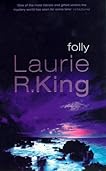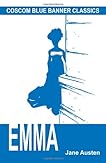 Mansfield Park
Mansfield Park by
Jane AustenMy rating:
4 of 5 starsI have to admit that this is my least favorite of Jane Austen's novels. Her character, Fanny Price, is just a little too humble and nice. I think everyone would like her better if she just got angry with the way she was treated from time to time. She was a niece of her mother's sister who was taken in by the family when she was about 11. Her own mother did not marry well and the poverty of her home and the large number of siblings prompt her Aunt Norris to suggest to her sister that Fanny come to live at Mansfield Park. Fanny begins her life with the four Bertram cousins, and while she is educated, she lives a life of a half-servant, waiting on her Aunt Bertram.
As the novel progresses, we see the superficiality of her cousins and their parents as well as the interfering hypocrisy of her Aunt Norris. Sir Thomas has made his wealth by dealing in slavery, his wife is so indolent and self-absorbed that she neglects her children and does not seem at all interested in developing their character, which leads to disastrous consequences as the book progresses. As with most of Jane Austen's books, the main focus of the book is marrying someone wealthy.
Fanny somehow has managed to have a deep moral sense and spirit of humility and stands in contrast to her cousins. The only one whom she has a relationship is her cousin, Edmond, the youngest son. His desire is to take Holy Orders and, unlike most wealthy young men of his class, does it from a true desire to minister to the people he is called to serve.
Into this mix come a brother and sister who are visiting the local Vicar. While they are superficially charming, they are extremely shallow and amoral. Edmond falls in love with Mary and while she tells him that she will never be a clergyman's wife as there is no prestige or income, she flirts with him outrageously and tries to change his position. Her brother is very attached to the two older sisters, but eventually decides to flirt with Fanny to amuse himself and ends up falling in love with her.
I have to admit that this is my least favorite of Jane Austen's novels. Her character, Fanny Price, is just a little too humble and nice. I think everyone would like her better if she just got angry with the way she was treated from time to time. She was a niece of her mother's sister who was taken in by the family when she was about 11. Her own mother did not marry well and the poverty of her home and the large number of siblings prompt her Aunt Norris to suggest to her sister that Fanny come to live at Mansfield Park. Fanny begins her life with the four Bertram cousins, and while she is educated, she lives a life of a half-servant, waiting on her Aunt Bertram.
As the novel progresses, we see the superficiality of her cousins and their parents as well as the interfering hypocrisy of her Aunt Norris. Sir Thomas has made his wealth by dealing in slavery, his wife is so indolent and self-absorbed that she neglects her children and does not seem at all interested in developing their character, which leads to disastrous consequences as the book progresses. As with most of Jane Austen's books, the main focus of the book is marrying someone wealthy.
My objections to the book are that it sags in the middle under the weight of too many examples of the superficial details of the main characters lives. Fanny is appalled at their behavior and that redeems her, not because she is a prig, but because she stands alone against overwhelming derision. Her own background in her parents home is chaotic at best and she could hardly have learned such virtues there or at Mansfield Park. I think it is this strength of character that keeps her from being a simple character in a morality play. While this is a harder book to read that any of Austen's other works, it is still filled with the kinds of things we expect from her works.
View all my reviews
 Murder In Chinatown by Victoria Thompson
Murder In Chinatown by Victoria Thompson 19614 members
19614 members False Mermaid: A Novel by Erin Hart
False Mermaid: A Novel by Erin Hart Lake of Sorrows by Erin Hart
Lake of Sorrows by Erin Hart The Chili Queen by Sandra Dallas
The Chili Queen by Sandra Dallas Haunted Ground: A Novel by Erin Hart
Haunted Ground: A Novel by Erin Hart The No. 1 Ladies' Detective Agency by Alexander McCall Smith
The No. 1 Ladies' Detective Agency by Alexander McCall Smith The Charming Quirks of Others by Alexander McCall Smith
The Charming Quirks of Others by Alexander McCall Smith The Lost Art of Gratitude by Alexander McCall Smith
The Lost Art of Gratitude by Alexander McCall Smith Hiss of Death by Rita Mae Brown
Hiss of Death by Rita Mae Brown Duplicate Keys by Jane Smiley
Duplicate Keys by Jane Smiley New Mercies by Sandra Dallas
New Mercies by Sandra Dallas Spanish Dagger by Susan Wittig Albert
Spanish Dagger by Susan Wittig Albert Daniel by Henning Mankell
Daniel by Henning Mankell The Lost World by Arthur Conan Doyle
The Lost World by Arthur Conan Doyle The Lost World by Arthur Conan Doyle
The Lost World by Arthur Conan Doyle Buster Midnight's Cafe by Sandra Dallas
Buster Midnight's Cafe by Sandra Dallas The Persian Pickle Club by Sandra Dallas
The Persian Pickle Club by Sandra Dallas The Man Who Knew Too Much by G.K. Chesterton
The Man Who Knew Too Much by G.K. Chesterton The Wonderful Wizard of Oz by L. Frank Baum
The Wonderful Wizard of Oz by L. Frank Baum The Cincinnati Red Stalkings by Troy Soos
The Cincinnati Red Stalkings by Troy Soos Death of the other self by Peter Packer
Death of the other self by Peter Packer Death of the other self by Peter Packer
Death of the other self by Peter Packer Murder at a Vineyard Mansion by Philip R. Craig
Murder at a Vineyard Mansion by Philip R. Craig Murder at a Vineyard Mansion by Philip R. Craig
Murder at a Vineyard Mansion by Philip R. Craig Infamous Lady: The True Story of Countess Erzsébet Báthory by Kimberly L. Craft
Infamous Lady: The True Story of Countess Erzsébet Báthory by Kimberly L. Craft The Wise Woman by George MacDonald
The Wise Woman by George MacDonald The Children's Blizzard by David Laskin
The Children's Blizzard by David Laskin The Art of Detection by Laurie R. King
The Art of Detection by Laurie R. King Curiosity Killed the Cat Sitter by Blaize Clement
Curiosity Killed the Cat Sitter by Blaize Clement The Tale of Hawthorn House by Susan Wittig Albert
The Tale of Hawthorn House by Susan Wittig Albert The Tale of Cuckoo Brow Wood by Susan Wittig Albert
The Tale of Cuckoo Brow Wood by Susan Wittig Albert The Tale of Holly How by Susan Wittig Albert
The Tale of Holly How by Susan Wittig Albert The Tale of Hill Top Farm by Susan Wittig Albert
The Tale of Hill Top Farm by Susan Wittig Albert Folly by Laurie R. King
Folly by Laurie R. King Home to Holly Springs by Jan Karon
Home to Holly Springs by Jan Karon Mansfield Park by Jane Austen
Mansfield Park by Jane Austen The Cold Dish by Craig Johnson
The Cold Dish by Craig Johnson The Body Snatcher and Other Tales by Robert Louis Stevenson
The Body Snatcher and Other Tales by Robert Louis Stevenson Pride and Prejudice by Jane Austen
Pride and Prejudice by Jane Austen Emma by Jane Austen
Emma by Jane Austen Cure by Robin Cook
Cure by Robin Cook Cain His Brother by Anne Perry
Cain His Brother by Anne Perry The Woman in White by Wilkie Collins
The Woman in White by Wilkie Collins